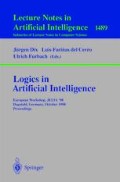Abstract
Propositional greatest lower bounds (GLBs) are logically-defined approximations of a knowledge base. They were defined in the context of Knowledge Compilation, a technique developed for addressing high computational cost of logical inference. A GLB allows for polynomial-time complete on-line reasoning, although soundness is not guaranteed. In this paper we define the notion of k-GLB, which is basically the aggre-gate of several lower bounds that retains the property of polynomial-time on-line reasoning. We show that it compares favorably with a simple GLB, because it can be a “more sound” complete approximation. We also propose new algorithms for the generation of a GLB and a k-GLB. Finally, we give precise characterization of the computational complexity of the problem of generating such lower bounds, thus addressing in a formal way the question “how many queries are needed to amortize the overhead of compilation?”
Access this chapter
Tax calculation will be finalised at checkout
Purchases are for personal use only
Preview
Unable to display preview. Download preview PDF.
References
M. Cadoli, Semantical and computational aspects of Horn approximations. In Proc. of IJCAI-93, pages 39–44, 1993.
M. Conforti and G. Cornuéjols. A class of logic problems solvable by linear programming. J. of the ACM, 42:1107–1113, 1995.
W. P. Dowling and J. H. Gallier. Linear-time algorithms for testing the satisfiability of propositional Horn formulae. J. of Logic Programming, 1:267–284, 1984.
A. del Val. An analysis of approximate knowledge compilation. In Proc. of IJCAI-95, pages 830–836, 1995.
D.S. Johnson, A catalog of complexity classes. In Handbook of theoretical computer science, Chapter 2, pages 67–161, J. van Leeuwen ed., Elsevier Sc. Pub., 1990.
H. A. Kautz and B. Selman. Forming concepts for fast inference. In Proc. of AAAI-92, pages 786–793, 1992.
H. A. Kautz and B. Selman. An empirical evaluation of knowledge compilation by theory approximation. In Proc. of AAAI-94, pages 155–161, 1994.
R. Schrag. Compilation for critically constrained knowledge bases. In Proc. of AAAI-96, pages 510–515, 1996.
B. Selman and H. A. Kautz. Knowledge compilation using Horn approximations. In Proc. of AAAI-91, pages 904–909, 1991.
B. Selman and H. A. Kautz. Knowledge compilation and theory approximation. J. of the ACM, 43:193–224, 1996.
Author information
Authors and Affiliations
Editor information
Editors and Affiliations
Rights and permissions
Copyright information
© 1998 Springer-Verlag Berlin Heidelberg
About this paper
Cite this paper
Cadoli, M., Palopoli, L., Scarcello, F. (1998). Propositional Lower Bounds: Generalization and Algorithms. In: Dix, J., del Cerro, L.F., Furbach, U. (eds) Logics in Artificial Intelligence. JELIA 1998. Lecture Notes in Computer Science(), vol 1489. Springer, Berlin, Heidelberg. https://doi.org/10.1007/3-540-49545-2_24
Download citation
DOI: https://doi.org/10.1007/3-540-49545-2_24
Published:
Publisher Name: Springer, Berlin, Heidelberg
Print ISBN: 978-3-540-65141-3
Online ISBN: 978-3-540-49545-1
eBook Packages: Springer Book Archive

